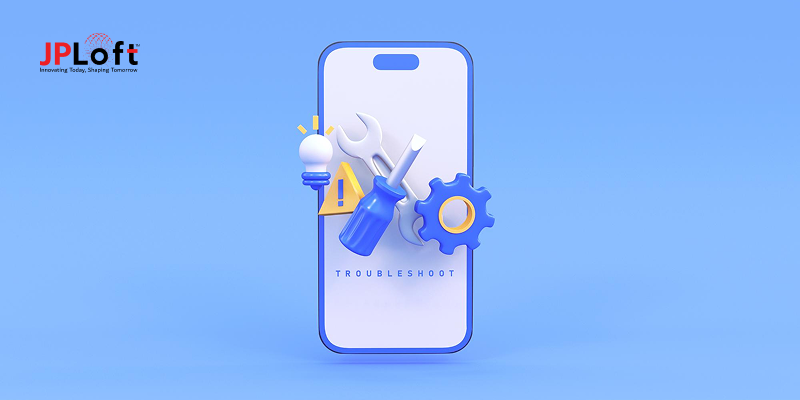Key Takeaways:
Security audits are now a critical component of app maintenance, safeguarding sensitive data and ensuring long-term performance.
Regular audits help identify code vulnerabilities, misconfigurations, and compliance issues before they become threats.
Integrating audits in the app lifecycle boosts user trust, data integrity, and platform stability.
As cyber threats evolve, businesses need a proactive security plan – audits make this possible.
Collaborating with experienced developers like JPLoft ensures that security isn't an afterthought but a core strength of your digital product.
Your app may look great, but is it safe?
This world is significantly linked, and cyberattacks happen more often, better, and faster. A fancy user interface or a long list of great features won't protect your app or your users.
If you don't perform regular security audits as part of app maintenance, you're ignoring the importance of security audits in app maintenance, leaving your app a beautifully designed vulnerability just ready to be used.
A single breach could cost you millions in fines, lawsuits, and lost trust as we enter 2025 and data privacy laws become tighter. Users are also more privacy aware.
Security audits look at your code, integrations, APIs, and encryption protocols to stop threats before they get in. They don't just focus on fixing bugs.
How to solve it?
Do not treat security auditing as an aside in your maintenance strategy. There is only one way forward: proactive protection.
In this blog, we'll explore why security audits are no longer unnecessary in 2025, what key areas they cover, when you should perform them, and how they play a vital role in keeping your app secure, compliant, and future-ready.
Understanding Security Audits in the Context of App Development
Imagine launching your app on App Store or submitting your app to the Play Store to positive reviews, only to find a hidden vulnerability that puts your users' data at risk.
Scary, right?
In today's high-stakes digital world, this nightmare is all too usual without proper security measures.
A single security gap in your app's architecture, codebase, or third-party integrations can open doors for cyberattacks.
These threats aren't just bugs to fix; they're possible disasters ready to happen.
One-time security checks won't cut it anymore, especially as apps grow more complex with new features and scaling demands.
This is where Security Audits in App Maintenance come into play.
A security audit in app maintenance is a thorough, ongoing review of every part of your app, from its code and infrastructure to external integrations, to spot weaknesses before attackers do.
Unlike random testing, security audits change constantly as your app grows, ensuring robust encryption, compliance, and protection at every stage.
Whether you're managing a fintech app, e-commerce platform, or any scalable solution, regular security audits are essential to keep your app secure and trustworthy.
In mobile app development, building your offering is just the beginning. Protecting it through continuous security audits is what keeps it going safely and sustainably.
Because in today's world, building the app is only half the job, defending it is the rest.
The Role of Security Audits in the App Lifecycle
Ever pushed an update only to discover a major vulnerability that wasn't caught in time?
That expensive problem is all too usual when the importance of security audits in app maintenance is treated as an aside. Apps constantly change, whether it's rewriting code, putting out new features, or merging APIs.
Each change brings possible risks. Without constant security checks, these hidden vulnerabilities can slip through, putting your app and users at risk.
In this era, the security audit importance in app maintenance for 2026 isn't just about a one-time job; it needs to be effortlessly integrated across the entire app lifecycle.
From beginning development to every maintenance cycle, audit integration is essential for:
-
Detecting hidden vulnerabilities during code refactors.
-
Validating changes before release.
-
Monitoring API behavior post-deployment.
This proactive, continuous auditing approach doesn't just safeguard your app; it improves agility, allowing faster, safer releases while significantly cutting down expensive fixing and crisis management later.
Key Elements Evaluated During a Security Audit
Below are the key elements evaluated during a security audit to ensure your app stays protected, compliant, and resilient against threats:
1. Source Code Analysis
Source code analysis forms the backbone of successful application security testing.
This process includes using both automated tools and manual code reviews to scrutinize the app's source code.
The goal is to discover hidden logic flaws, insecure coding practices, injection vulnerabilities, and dangerous hard-coded passwords that attackers can abuse.
Automated scanners effectively discover known security weaknesses, while manual inspections provide critical context and identify minor, complicated issues that tools might miss.
By thoroughly analyzing the source code, app developers can proactively address security gaps early in the development process.
This basic step ensures that the app's core stays secure, significantly lowering the risk of data breaches and improving overall app resiliency.
In short, robust source code analysis is key to building trustworthy, secure apps.
2. Data Protection & Encryption Protocols
Data protection and encryption protocols are vital bases of app security.
During security audits in app maintenance, a critical focus is on confirming whether sensitive data is properly encrypted both at rest and in motion.
This means ensuring your app uses robust encryption standards such as TLS for data in motion and AES for saved data.
Additionally, secure key management practices are examined to avoid illegal access to encryption keys.
Proper encryption safeguards user information from interception, tampering, and theft, matching industry best practices and legal requirements.
By carefully auditing these protocols, developers can ensure that the app's data handling meets strict security standards, reducing risks and reinforcing user trust, highlighting the importance of security audits in app maintenance.
Effective encryption is not just a feature, it's a necessity in today's app environment.
3. Authentication and Authorization Flows
Authentication and permission are critical security components that control who uses your app and what they can do.
Weak login mechanisms, poor session management, or improperly set access roles can create serious vulnerabilities that hackers exploit to gain illegal entry.
During security audits in app maintenance, these aspects are carefully examined, confirming the strength and reliability of login systems, the security of session keys, and the implementation of role-based access control (RBAC).
Ensuring these flows are robust helps prevent unwanted access, protects sensitive data, and maintains the integrity of your app's security stance.
4. Third-Party Integrations & API Security
APIs are the lifelines of modern apps, but they're also prime targets for cyberattacks.
During a security audit, every open server gets a thorough app vulnerability assessment to identify potential risks like broken object-level authorization, improper authentication, and excessive permission limits, underscoring the security audits importance in app maintenance.
Over-permissioned APIs can give hackers more access than intended, while unprotected connections leave the door wide open.
By evaluating API traffic, usage trends, and access controls, audits help ensure your integrations stay tight, secure, and compliant, especially crucial in complex app ecosystems where multiple services interact in real time.
5. Regulatory Compliance (GDPR, HIPAA, PCI-DSS, etc.)
Whether your app serves healthcare, banking, or a global user group, security compliance isn't just an option; it's a business-critical necessity.
A single misstep could lead to legal nightmares, huge fines, or total brand damage. That's where security audits step in.
They map every layer of your system against top compliance frameworks like HIPAA, GDPR, and PCI-DSS, ensuring your app meets regulatory demands without affecting performance.
These audits confirm that data handling, user consent, and storage protocols are airtight, making your app not just secure but also legally future-proof.
Frequency and Timing: When Should You Conduct Security Audits?
Think of your app like a high-performance engine. It might run smoothly today, but without regular checkups, one missed glitch can bring the whole machine down.
In the fast-paced digital world of 2025, security audits aren't rare fixes; they're strategic routines.
Here's how the pros are keeping ahead:
-
Quarterly Security Audits: These are ideal for busy, live apps where changes and user activity are ongoing. They help in finding vulnerabilities before attackers do.
-
Pre-Release Audits: Before pushing a significant update or putting out new features, an audit ensures your changes don't create new security holes.
-
Post-Incident Audits: If a breach or strange activity happens, instant auditing helps assess the damage, seal vulnerabilities, and reinforce protection.
This rhythm ensures more than just safety, it provides peace of mind, faster changes, and loyal users who trust your platform.
By adding strong app maintenance tools into your routine, you're not just responding to issues, you're staying ahead of them.
Because when it comes to app maintenance, predictable protection driven by the right tools always beats random fear, every single time.
Benefits of Regular Security Audits for App Owners
You didn't build your app to babysit breaches or patch leaks under pressure. You built it to perform, impress, and grow.
But here's the catch: without regular checks that highlight the security audits importance in app maintenance, you're leaving the vault door half open.
Let's break down why security audits are the quiet stars behind every successful app in 2025:
► Proactive Threat Mitigation
Waiting for a breach to happen is no longer a strategy. With cyber dangers getting more complex, regular security audits act as your early warning system.
They discover vulnerabilities, whether it's old libraries, open sites, or insecure authentication flows, before they're abused.
This proactive approach helps match your mobile app maintenance strategy with the changing mobile app danger environment.
► Improved App Performance and Reliability
Security and performance often go hand in hand, especially with the rise of AI in mobile apps.
Maintenance. Regular security audits don't just plug vulnerabilities; they improve the entire codebase for better performance.
By finding inefficient scripts, old dependencies, and incorrect settings, audits driven by AI help developers create faster-loading apps that crash less and grow more smoothly.
This preventative cleanup improves user experience, reduces downtime, and slashes long-term maintenance costs.
With AI in App Maintenance, you're not just protecting your app, you're fine-tuning it for peak efficiency and future growth.
► Enhanced User Trust and Retention
In an age of data leaks and privacy issues, people are hyper-aware of how their data is managed.
A single slip can shake their faith. Conducting frequent security audits strengthens your brand's pledge to protect user data.
It sends a clear message: this platform takes security seriously. That trust, once built, plays a critical role in user engagement and long-term allegiance.
► Avoiding Legal and Financial Liabilities
The legal consequences of a security breach are enormous.
Whether it's breaking GDPR, HIPAA, or PCI-DSS, non-compliance can lead to steep fines, lawsuits, and irreversible damage to your image.
Security audits help ensure your app stays aligned with regional and global compliance frameworks, reinforcing the importance of security audits in the app maintenance.
More importantly, they reduce the risk of financial damage from breaches that could cost millions.
► Strengthened Business Reputation
In a world where news moves faster than code builds, trust is fragile. One security misstep can echo louder than your app's best features.
Regular audits act as your digital image shield, showing that your brand takes reliability seriously.
Whether it's users, partners, or investors, they're all watching. Show them you're not just another app, but one that understands the importance of security audits in app maintenance.
► Faster, Cleaner Development Cycles
Rolling out new features on top of old or shaky code is a risky move, one that can spike mobile app maintenance costs through bugs, delays, and frustrated users.
Regular security audits remove that doubt by keeping your app's base clean, optimized, and secure.
By finding vulnerabilities and inefficiencies early, you reduce the chances of expensive reworks down the line.
With a stable core in place, your team can ship changes quickly and trust, without second-guessing every change.
In today's fast-paced market, stability isn't a luxury. It's your springboard for constant creativity and cost-effective growth.
► Early Warning System for Compliance Shifts
Having audit logs and thorough assessments at your fingertips means you stay fully aligned with constantly changing regulations.
This preventative approach lets you expect compliance shifts before they become serious problems, allowing your team to plan and adapt easily.
Rather than making last-minute fixes or scrambling under pressure, you maintain control and trust.
Staying ahead of the curve not only reduces stress but also positions your app and business as responsible, reliable, and forward-thinking in a complicated regulatory world.
► Peace of Mind (a Seriously Underrated Asset)
There's nothing quite like the trust that comes from knowing your app is secure, fully compliant, and working smoothly.
This kind of peace of mind isn't something you can fake or skip; it's earned through diligent security audits and ongoing maintenance.
For owners, CTOs, and product leads, it means more than just technical assurance; it's the freedom to focus on innovation and growth without constant worry about vulnerabilities or regulatory dangers.
Ultimately, this calm confidence, built on the importance of security audits in app maintenance, is the basis of sustained success in today's competitive app landscape.
Top Tools and Frameworks for Security Audits in App Development
In today's app-driven world, where every line of code can be an entrance or a weakness, security audits are your app's soldiers, watchful, relentless, and exact, underscoring the importance of security audits in app maintenance.
But even the best bodyguards need the right tools to spot threats hiding in shadows.
That's where cutting-edge security audit tools and frameworks come in, providing your team with automation, speed, and accuracy to stay one step ahead of cybercriminals.
Let's explore the top tools that make security audits not just a stop, but a strategic advantage in app development today.
1] OWASP ZAP – The Go-To Tool for Web App Security Audits
The Open Web Application Security Project (OWASP) Zed Attack Proxy (ZAP) is an open-source tool widely regarded as one of the best for web application security testing.
It is designed to spot vulnerabilities such as cross-site scripting (XSS), SQL injection, and other common risks in web applications.
OWASP ZAP's user-friendly interface and active community help make it ideal for both newbies and experienced security professionals.
Integrating ZAP into your continuous integration (CI) process helps ensure ongoing protection throughout the app lifecycle.
2] Burp Suite – Dynamic Analysis Made Simple
Burp Suite is a complete platform for dynamic web application security testing.
It allows security teams to scan live applications and examine replies to discover security flaws in real-time.
Its set of tools includes detecting proxies, scanners, and attacker modules, giving freedom and depth for manual and automated testing.
Burp Suite's features make it particularly effective for security testers trying to model cyberattacks and examine an app's resistance.
3] Checkmarx & SonarQube – Source Code Auditing Champions
Secure coding practices start with careful source code analysis.
Checkmarx and SonarQube are two of the most powerful static application security testing (SAST) tools in the market.
They scan the app's source code for vulnerabilities like insecure data handling, authentication flaws, and dangerous third-party libraries.
These tools integrate smoothly into development platforms and CI/CD processes, allowing developers to catch and fix security issues early, long before release.
4] Qualys & Nessus – Infrastructure Scanning Essentials
Security isn't just about the app itself; the base infrastructure also needs care.
Qualys and Nessus are leading vulnerability assessment tools that scan computers, networks, and cloud environments for weaknesses.
They find old software, misconfigurations, and known vulnerabilities that could be abused to compromise the app's backend systems.
Regular checks with these tools help maintain a strong security stance across the entire application ecosystem.
5] Postman & Insomnia – Securing API Integrations
APIs are critical for modern apps, allowing smooth contact between services. However, unprotected APIs can become a primary attack avenue.
Tools like Postman and Insomnia offer robust features for testing API sites, confirming authentication mechanisms, and ensuring secure data exchange.
By adding these API testing tools into security audits, developers can safeguard integrations and prevent unwanted access.
Leveraging the right tools and frameworks can change your mobile app maintenance process from reactive fixing to proactive protection.
Whether you're a coder, product owner, or security worker, combining tools like OWASP ZAP, Burp Suite, and Checkmarx, Qualys can be helpful in enhancing the overall security of the app.
Well, you can hire dedicated developers for effectively maintaining your app using the advanced security audit tools.
Why Automating Security Audits Matters?
Utilizing security tools not only simplifies the otherwise tedious task of security auditing but also standardizes testing protocols.
Automation in app maintenance plays a key role here, it ensures uniform security checks across development cycles, reduces human mistakes, and speeds the discovery of vulnerabilities.
Together, security tools make a complete security audit toolbox that covers every layer, web apps, source code, infrastructure, and APIs, making your app not just secure, but future-ready and strongly resilient.
Security audits are critical to safeguarding your app in 2025 and beyond.
Postman ensures your app stays secure, compliant, and trusted by users.
Start building a robust security audit system today to future-proof your app against changing threats.
Now, let’s explore the crucial practices to secure the app in the following section.
Security Audit Best Practices for App Developers
Mobile app security audits aren't just a box to tick; they need to be a natural part of your development routine.
If you want your app to stay ahead of hackers and keep users safe, here's how to do it right.
A] Embed Security Audits into Your Development Lifecycle
Security audits must be an essential part of your Secure Software Development Lifecycle (SDLC).
Instead of taking audits as a final step before launch, weave them throughout your development process.
Early and frequent security reviews help spot vulnerabilities while they're easier and less costly to fix.
B] Balance Automation with Manual Testing
While automated tools speed up vulnerability discovery, they can't catch everything.
Logic flaws, business rule violations, and minor security holes often require human understanding and knowledge.
Combine automated scanning with thorough manual testing to discover hidden risks that robots might miss.
C] Regularly Review Access Controls and Permissions
Access management is a popular attack route.
Regularly audit your app's access controls and permission settings to ensure users and services have only the minimum necessary powers.
Over-permissioned accounts can open backdoors for attackers.
D] Vet Third-Party SDKs and Libraries
Third-party components accelerate development but bring external risks. Always perform rigorous security testing on third-party SDKs before integration.
Unvetted libraries can bring in vulnerabilities that compromise your entire app.
E] Train Developers on Code Review and Security Testing
A well-informed team is your first line of defense.
Invest in ongoing training so developers understand secure coding principles, common vulnerabilities, and effective code review techniques.
Empowering your team with security knowledge creates a mindset of adequate protection.
By following these best practices, app developers can build better, safer apps that stand up to today's changing online risks. Security audits aren't just a job, they're an attitude.
Consequences of Neglecting Security in App Maintenance
Skipping security audits isn't just risky, it can be downright catastrophic for your app and business.
The impact from missing this crucial step can hit you where it hurts most: user trust, legal standing, and your bottom line.
1. Stolen User Data
Without regular audits, vulnerabilities go unnoticed, making easy targets for hackers. This can lead to stolen personal information, payment details, or sensitive business data.
Such breaches not only compromise your users' privacy but also open you to severe brand damage.
2. App Store Bans
Major sites like Google Play and Apple's App Store follow strict security standards.
Apps that fail to meet these standards risk removal or bans, cutting off your access to millions of potential users and stalling growth overnight.
3. Legal Non-Compliance
Regulations like GDPR, HIPAA, and PCI-DSS are non-negotiable in many businesses. Failing to perform security audits often means failing to meet these laws.
The result? Expensive fines, legal fights, and a damaged company image.
4. Trust Erosion
Users today are more security-conscious than ever. One data breach or security mistake can erode trust quickly, sending users to rivals and making recovery a hard fight.
Users today are more security-conscious than ever. One data breach or security mistake can erode trust quickly, sending users to rivals and making recovery a hard fight. Once lost, that trust often requires significant time, resources, and transparency to rebuild.
5. Financial Losses
Beyond fees and lost users, the cost of crisis reaction, repair, and downtime can be staggering.
Minor bugs missed in audits can progress into business-crippling events that drain resources and stunt growth.
Ignoring security audits, whether website audits or app-specific tools, is a chance no app owner can afford. Prevention isn't just better than a fix, it's essential for life.
How JPLoft Implements Security Audits in Ongoing Maintenance Services?
JPLoft delivers the best mobile app maintenance services by embedding continuous security audits into every phase of app upkeep.
Using cutting-edge AI combined with expert manual reviews, we proactively identify vulnerabilities, monitor access controls, and test third-party integrations.
This approach helps prevent security breaches before they occur, ensuring your app remains compliant and protected.
By integrating automated and manual audits, JPLoft reduces risks and maintenance costs, keeping your app stable and trustworthy.
Whether you're scaling a startup or managing an established product, JPLoft's security audits guarantee peace of mind and ongoing app resilience.
Wrapping Up
As digital threats become more complex, the value of security audits in app maintenance continues to grow.
Protecting user data, ensuring compliance with regulations, and keeping smooth business operations all rely on thorough and regular audits.
Security audits are more than just a routine; they act as a shield against vulnerabilities, build user trust, and pave the way for long-term success in 2025 and beyond.
Incorporating thorough security audits into your app maintenance strategy means staying one step ahead of new threats.
In a digital world where trust is everything, investing in robust security audits is the key to safeguarding your app's future and earning the faith of your users.
FAQs
It's a deep check-up that finds hidden vulnerabilities, misconfigurations, or data leaks in your app. Regular security audits are a must for smooth, secure app maintenance.
Cyber threats are getting smarter and sneakier, especially with AI in the mix. In 2025, security audits are your app's first line of defense and compliance proof
Ideally, run them quarterly and before every major update. Frequent mobile app security audits help you stay proactive, not reactive.
They clean up buggy code, outdated libraries, and insecure scripts. That means faster load times, fewer crashes, and more stable app performance.
Absolutely, AI in app maintenance automates threat detection and speeds up patching. It saves time and reduces human error in your audit process.
One missed vulnerability can lead to stolen data, legal trouble, or app bans. Skipping audits is like driving blind, risky, costly, and totally avoidable.














Share this blog